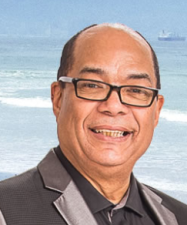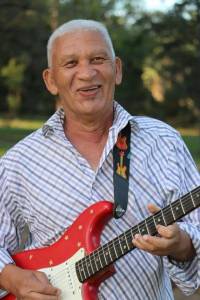
The original Invaders, the most popular band in South Africa in the mid-Sixties. . . from left, Dave Burke (drums), Errol Gobey (vocals and rhythm guitar), Joe Moses and Johnny Burke (bass).
7 February 2021
The Invaders, four guys from Uitenhage, probably would not have believed it if they had been told, back in the ‘60s that their innovative playing would send “shockwaves” around the music industry.
But that they did, with a raw, earthy sound that reverberated across South Africa as pop music fans in the disadvantaged communities latched onto a style that resonated with their roots.
It was the revelation of the 1960s when the group – Johnny Burke, his brother Dave, Errol Gobey and Joe Moses –churned out hit after hit and gold discs with songs like Shockwave, Kongo Kwela, Ice Cream and Suckers, June, Last Date and Crying In The Chapel.
While the Beatles and US soul music was all the rage at the time, The Invaders were copying the instrumentals of the then top British group, The Shadows. But, in time, they tweaked their style and came up with a sound that shaped their destiny.
Fans loved it. So did the young musicians who were looking for role models.
Jerry Watt, veteran guitarist of The Rockets, was one of them. He remembers those heady days in the late Sixties when he was starting out with a teenybopper group called The Fantastics.
“Man, The Invaders were awesome,” Jerry said. “They were our idols. Myself, the Brown brothers, Claude and Frankie, Warwick Hawkins and Basil du Pont, we were young teenagers just starting out in Athlone and we looked to older groups to inspire us. The Invaders did.
“Joey Moses on lead guitar, especially, had our attention. He was doing all those crazy sounds with his guitar. None of the other bands did it. Joey came out with that sound on Shockwave and no one really knew what it was. Turned out it was a Zonk fuzz box with a wah-wah pedal you could use on a guitar.
“We also copied all their movements on stage. Joey had that eye flutter thing that sent the fans crazy. So Claude copied it. We copied it all to a T.”
Jerry said The Fantastics at one stage even contemplated changing their name to Junior Invaders.
“We did one or two shows with them at the old Palace Cinema in Salt River, but our performance was too similar to theirs, I think, so that idea was canned.
The original Invaders played their last gig about 50 years ago but for some, their music has never really died.
Now, in these digital days and social media, interest in the group is on the rise. There is a very active Facebook group, run by Johnny’s daughter Melanie, exchanging memories of The Invaders . . . fans who recall seeing them playing in little towns and villages off the beaten track, from Rehoboth in Namibia to Keimoes, Oudtshoorn and Hankie on the other side of the country. One fan recalls dancing to their music in a storage facility on a farm because their town had no venue available for a function.
These are all fans who get that feelgood sensation brought on by the nostalgia of their youth.
But what about the Millennials? Do they know enough about these four young men from Uitenhage who enjoyed a status on par with The Flames and probably outsold them record-wise?
Probably not. So here’s a potted history of the Invaders. The four were all Uitenhage locals and the group, after some initial personnel changes around 1962, looked like this: Johnny Burke, group spokesman on bass, his brother Dave on drums, rhythm guitarist and lead vocalist Errol Gobey, and baby of the group, Joe Moses, on lead.
After establishing themselves in the PE region at venues like The Reno, the Jubilee Hall and the Crown Bioscope in Veeplaas, The Invaders headed for the Western Cape where, in the words of Joe Moses, the fans put them on a pedestal.
“They absolutely loved us,” Joe said. “We were so popular that on one occasion at a gig in Elsies River, we caused a traffic jam.”
Promoter Hamza Mukkadam had the group playing to packed houses from The Boland through Bellville South, Elsies, Athlone and Wynberg. Then the group would head off and do the rest of the country.
Joe Moses recalls one particularly “scary” situation when he had to run from the fans. “We had a gig at Battswood in Wynberg and a whole lot of girls chased me. I had to duck into a shop and hide behind the counter.”
The heavy schedule of gigs took its toll on Errol’s voice and he quit the group late in ’68. In quick succession they took on singer Noel Mitchell and then Claude Palmer but that didn’t last too long and a few months later, Errol came back.
In August ’69, top singer Lionel Petersen joined the group and their popularity soared even more with his silky voice.
In early 1970, at the peak of their popularity in South Africa, The Invaders left for Europe to broaden their horizons. People close to the group felt that that was a wrong move that contributed to the demise of the group.
In an interview in 1978, Dave Burke said: Our downfall came when we went on an overseas trip while we were still right at the top of the popularity charts in South Africa. Everything was arranged haphazardly and it turned out to be a very expensive episode.”
In the same interview, Dave also shed some light on brother John’s passing in 1978 after being hospitalised with a serious medical condition. John, along with Joe Moses, had become Jehovah’s Witnesses a few years earlier, and in accordance with his faith, John declined a blood transfusion that could have been life-saving.
“I argued on moral and scriptural grounds, but as with everything else, Johnny would not relent,” Dave said.
Many believed the religion factor was another significant contributor to the group breaking up.
A change in direction in their music style was also a factor. They tried the psychedelic/underground stuff popular in the late Sixties but in the end, the only sound their fan base wanted was the “jiet/kwela” style that they loved. Johnny, who was leader and spokesperson for the group was adamant at the time that the group had to develop their sound.
The group broke up in 1971 but not after a string of hits that earned them multiple gold records.
They regrouped in 1976, ostensibly to do recordings, but it did not last long. In 1977, younger members of the Burke family – Clement, Colin, Greg – and Joe formed Rainbow but that too didn’t last long.
Joe Moses is the only member of the original Invaders who is still active, to a degree. In recent years he released an album but it had a mixed reception.
He looks back on his time with the Invaders with mixed emotions. Although the group did exceptionally well in those years, financially he has little to show for it and regrets not paying too much attention to detail with regard to songs he composed.
He also believes the overseas trip, where they met some big names including Paul McCartney, was not the best move for the group at the time.
Joe has had a few gigs over the years but the one that stands out was getting a guest spot on The Rockets’ tribute show as part of their acknowledgement to The Invaders.
What he is not so crazy about is having to play all the old hits every time he appears before a crowd. “It’s strange, I don’t really like the songs anymore. It old, it’s too old. I want to bring in new tunes. But the people won’t hear of it. They want the tunes of yesteryear. That’s what they are like. You can’t change the people.”
One of Joe’s biggest thrills was playing front of a crowd of thousands at Durban’s Curries Fountain on the same bill with The Flames who vied with them to be SA’s most popular group.
“That was the most people I ever played in front of,” Joe said. “It was quite an experience. More than 5000 people. Of course, we played first. It was Durban, their hometown after all. Their vocals were great but think our instrumentals were tops.”
A measure of the high esteem in which Joe is held can be gauged by the fact that Jerry Watt did a tribute album to him and The Invaders back in 2000.
Social media has given the legacy of the group a new lease on life. They were just four ordinary guys from a little town 37km from Port Elizabeth. But they rocked the world of thousands across the country and that “shockwave” is still causing ripples.
CLICK ON THE PICTURES TO ENLARGE
All material on this page is copyrighted. Permission should be obtain to use any part of it.







Great overview. This is heritage and history that must be preserved. The curriculum Section of the Nelson Mandela District with a teacher at Uitenhage High School tried to do Heritage piece on the Invaders a few years ago. It would have been so much better if only we could have consulted with you. The late Johnny Allison the legendary Histoty & Afrikaans teacher of UHS used to say ” n band issie n band voor Uitenhage se mense nie vir hulle gedabs het nie” One band that passed that test with flying colors must be The Invaders. Excellent work!
LikeLike
Thank you for your comment. I’d be happy to help where I can.
LikeLike
Had the privilege if seeing them play at the Eldorado Cinema in Grassy about 1967, my brother Dya Pillay and a high school friend Frank Moody had the privilege of singing on stage with them.
LikeLike
The Invaders were so professional. We just loved their music. Saw them in concert in Johannesburg all those years ago. Their instrumentals sounded like The Shadows. They had an amazing stage presence.
I would like to purchase their 58 track recording by Gallo. Please advise where I could buy it.
LikeLike
I will alert Pretoria record dealer Rashied Mohamed to this.
LikeLike
Acknowledge also Roger (Spewie) Pillay on keyboard, and Claude Palmer (singing It’s a groove). There was also another singer (can’t remember his name now) but I think he did the vocal on In the Chapel of Dreams.
LikeLike
That singer was my brother NOEL MITCHELL
LikeLike
Thanks for the valuable information. Much appreciated.
From where was your family those days, and is your brother still alive?
LikeLike
Love this article!
The Invaders have an entry on the South African Rock Encyclopedia website at http://rock.co.za/theinvaders/
Recently updated to be mobile-friendly.
LikeLike
I love reading about the Invaders! Loved their music 🙏💃🕺
LikeLike
Great stuff Warren. A recollection like only you can. Shared with your permission hopefully🙏
LikeLike
Share all you like
LikeLike